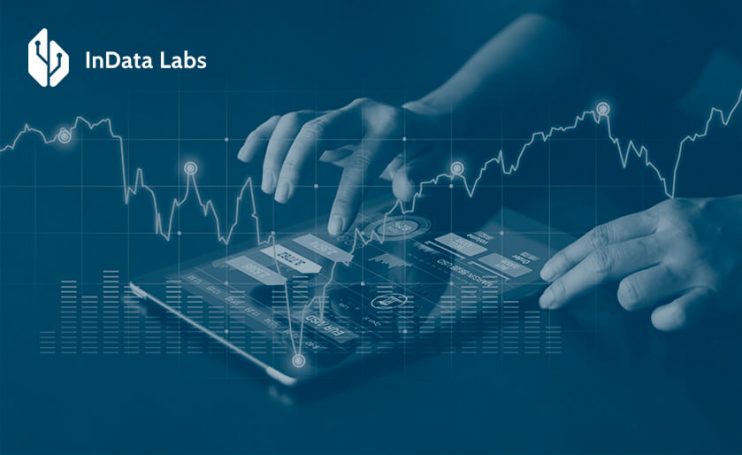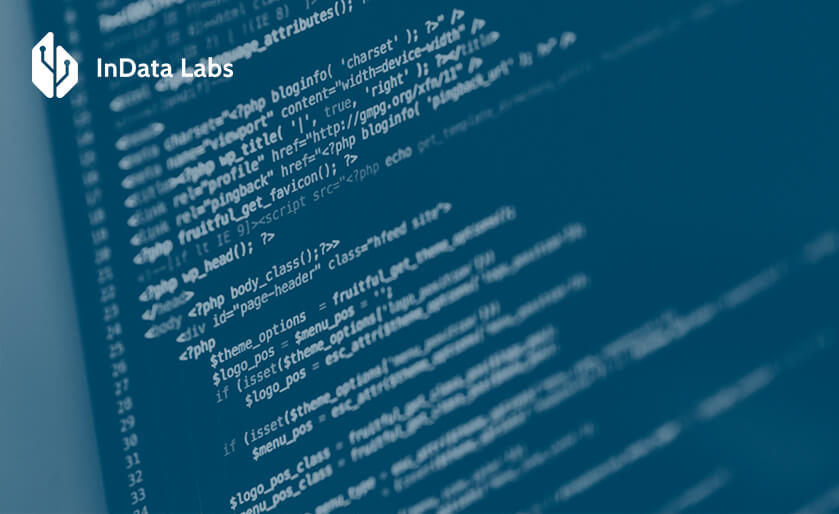The analysis of data and the application of statistical techniques to solve problems has been around for decades. However, it wasn’t until recently that data science impact on business became palpable. The rise of Big data and other technological advancements have resulted in this explosion of interest. Data science for business also became a powerful anti-pandemic tool. Thus, it’s now the cornerstone of building the knowledge required to navigate the new reality.
The numbers prove the omnipresence of data science for business. The global market size stood at $3.93 billion in 2019. During 2020 – 2027, it is set to grow further at a CAGR of 26.9%. But beyond numbers, what are the actual applications of Big data used in business? We’re about to find out.
What is the difference between data science and business analytics?
Data science for business and business analytics get equal mentions when it comes to insight generation. So what is the difference between data science and business analytics?
Data science is the application of statistical analysis, machine learning, data visualization, and programming to help you make better decisions. It’s a multidisciplinary field with backgrounds in mathematics, computer science, business intelligence, and even psychology. It is proving to be a powerful tool that can be used to generate insights into commercial situations that would otherwise remain hidden from view.
As for business analytics, it also relies on a concoction of technologies. In this case, it is computer software, statistical analysis, and business processes that help extract insight from input gathered from internal and external sources. Business analytics can be used in a variety of fields. Information technology, finance, human resources, and marketing are just some examples where business analytics play an important role.
The main difference between the two is the word ‘business’. Business analytics is restricted to commercial use and problems (profit, number of employees, etc.). Conversely, science has a much broader application area and a set of problems, thus being a superset of business analytics. Business analytics also relies on analytics tools to discern insights from data that a company can leverage for its strategy.
Let’s have a closer look at the crucial differences between the two.
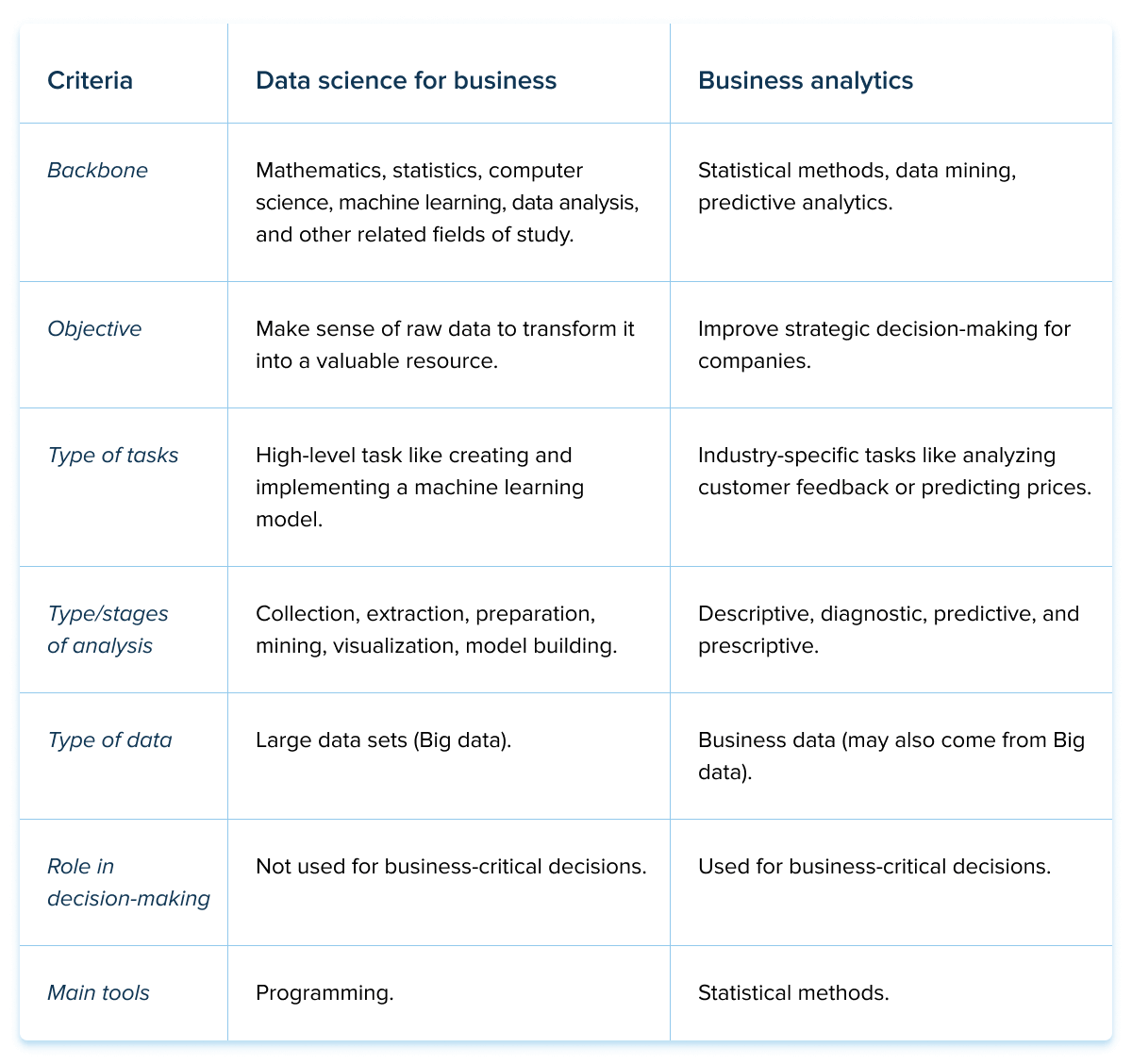
Therefore, data science is a more broad discipline. It is not limited to business use only and lays the foundation for business analysis. Business analytics is a narrow field that uses the core methodologies of science to produce mission-critical knowledge for businesses. Both business analytics and data science play a pivotal role for organizations.
Therefore, the question remains: why are data science partners pivotal to business decision-making? It’d be more logical to sing praises to business analytics, wouldn’t it?
What are the main benefits of data science?
The secret sauce of data science impact on business is its versatility. Data science for business professionals is a skill set that can be used to solve any problem, at any scale. From analyzing social media posts to making A/B testing calls, it is changing the face of business as we know it. Here are some other benefits of data science that make a difference in the business landscape.
Ensures business predictability
Being prepared and secured for the future is the key to business success. Predictive analytics solutions allow companies to anticipate trends in customer behavior. They usually rely on customer analytics and data science to process historical data. Customer trends often stem from changes in customer buying habits and consumption patterns. Using predictive analytics software, organizations can take advantage of their large amounts of data to make more informed decisions and improve profitability.
Amplifies real-time intelligence
Real-time business intelligence refers to the ability of a company to receive, process, and analyze information in real time. Businesses can now make faster decisions and have an up-to-the-minute understanding of their customers. The ability to capture time-sensitive benefits (e.g. seasonal peaks) also comes from real-time data processing. Logistics providers, manufacturers, and CRMs are just a sliver of those who benefit greatly from real-time analysis.
Makes customer experience granular
This discipline also helps companies to step up the customer experience. By knowing exactly the most beneficial product associations for your customers. you can fine-tune your product recommendations or make more targeted efforts. Thus, data scientists can crunch customer data to segment customers and flesh out accurate user personas to guide product initiatives.

Source: Unsplash
Helps test new business ideas
Data science along with machine learning consulting can assist businesses in tackling complex, data-rich problems. They add value by identifying new market trends, blazing new business trails, and targeting hidden weak points. For example, you can test the consumer’s flexibility towards price changes or perform benchmarking. Thus, a Google-commissioned study by IDG pinpointed the role of data analytics and intelligent solutions when it comes to helping businesses separate from their competition.
Promotes security
Analytical techniques are also being applied to derive insights from large datasets to improve the effectiveness of security operations. Thus, companies can now identify unusual activity that might point towards potential threats and fight off malicious agents. It also helps you build impenetrable protocols by introducing data-driven algorithms.
As you see, the benefits of data science are manifold and positively impact a wide range of critical business operations. But there’s another noteworthy advantage that should be mentioned in 2022.
Why is data science important for business: COVID edition
Along with other promising boons, processing capabilities can become your trump card in the pandemic realities and economic fallout. The very view of COVID-19 is only possible due to analyzing huge datasets such as hundreds of genomes. Not to mention the difference a data-driven mindset makes for businesses to withstand the turbulence.
According to McKinsey, companies have been using analytics to back up four areas. These include employee support and protection, decision-making, supply chain management, and customer engagement.
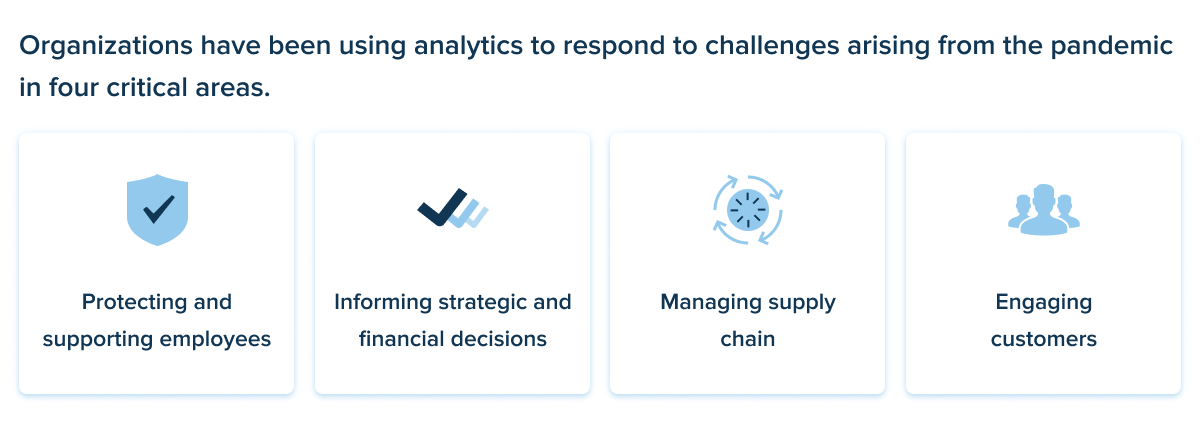
Source: McKinsey & Company
Ernst & Young, for example, also found a link between supply chain disruption and growing tech investments. Their survey demonstrates that US enterprises increase investment in supply chain technologies (AI, robotics, and data science) to stay afloat.
For example, demand for toilet paper and paper towels alone grew by 750% during the week of March 8, 2019, in the US. As a result, most companies were unable to satisfy the sudden demand. On the contrary, they could have leveraged data processing to improve visibility and have a holistic overview of the demand, inventory, capacity, supply, and finances across the ecosystem.
FAANG companies, for example, were fast enough to bounce back from the pandemic and even experienced a new influx of users. This wouldn’t be possible without real-time insight into the market.
Let’s dive into other success stories and data science business ideas commonly used for Big data business.
Top 5 data science business ideas
The role of a data scientist is one of the most sought-after jobs in the US. According to LinkedIn’s 2021 Emerging Job Report, the demand for this role is increasing steadily — demonstrating about a 35% average annual growth. It means that the business ecosystem has fully recognized the need for data science applied to business to bolster its growth.
Businesses looking to build a post-pandemic roadmap can add value by using data science business ideas. We’ll go over the most popular ones below.
Fraud and risk detection
All business processes are subject to change, especially today. And there’s not much as high-risk and vulnerable as introducing modifications into time-tested flows. Thus, according to The Financial Cost of Fraud Report, the UK is losing £137bn to fraud each year.
Data science can smoothen the transformation and predict possible trade-offs and weak points. The hallmark of analytics tools is their ability to process massive amounts of data in real-time. That is why they can quickly identify anomalies that differ from the usual operations stored in the system. To do that, data science consultants set up a baseline of non-fraudulent activity to compare against the suspicious dataset.

Source: Unsplash
Thanks to analytics, systems at the National Australia Bank warned a woman against fraudsters when she was trying to raise her account transaction limit. The software detected deviations from the normal activities thus hinting that something wasn’t right.
Effective risk management is another byproduct of data processing. Thus, companies can mine the past patterns and get a deeper understanding of future metrics, threats, and success rates. Also, predictions allow businesses to take a proactive stance and think of remedial measures beforehand.
Intelligent manufacturing
Another example of data science for business professionals is related to manufacturing. The key to the manufacturing industry’s competitiveness is its quality, cost, and delivery. To deliver these three aspects in a high-quality manner, manufacturers need a better understanding of their products and processes. That is why a growing number of manufacturers rely on analytics to optimize manufacturing processes.
For example, industrial automation company Oden Technologies came up with an ML-based tool that processes manufacturing input. It then pinpoints times of highest efficiency and gives recommendations on replicating golden optimum settings so that the machine operates at peak performance.
Besides effective equipment maintenance, manufacturers can leverage intelligence to:
- perform warranty analysis
- optimize prices
- design and develop new products
- perform inventory management
- predict demand
- anticipate supply chain risks and others.
Overall, effective processing and analysis introduce more visibility into manufacturing workflows. Data science impact on business encompasses everything from concept to transportation.
Assisted customer pathways
Retailers are also resorting to mighty data to transform insights into profit margins. Data science applied to business allows brands to make a dent in the market, enhance the customer experience, as well as boost sales and revenue.
Today, there are quite a few data points that link your customer to specific products, including:
- Search engine queries
- Celebrity and influencer activity
- Consumer attitudes and intent
- Current purchase data
By gathering and analyzing these points, companies can tailor their marketing efforts to specific customers. Moreover, they can automate relevant offerings and embed them into the recommendation engine. Companies such as Amazon, Netflix, Linkedin, and Pandora employ recommender systems to help consumers discover new and related items (products, movies, jobs, and music), resulting in a pleasant user experience and additional revenue.
Sentiment and behavioral analysis are other data-laden implementations. They can uncover hidden insights otherwise inaccessible for brands.
Autonomous driving
The recent surge in interest in autonomous vehicle technology has been fueled by the tremendous amount of data generated from sensors. The sheer volume and complexity of this data make it a key challenge. The scientists have to develop algorithms that can make reliable decisions about the current state of an autonomous vehicle and its environment. That is why input processing is used to power each step of driverless cars.
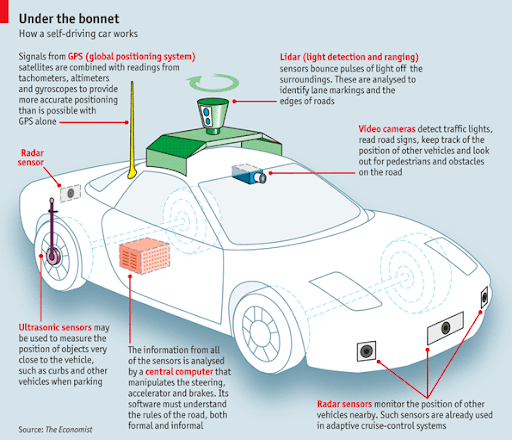
Source: The Economist
It is a combination of AI, ML, and computer vision that pinpoint the insights of self-driving vehicles. Data science, in return, lays the ground for each of the technologies and processes each data point in the system. Thus, engineers build algorithms that allow autonomous cars to identify certain objects and gather new data from their sensors.
Along the line, Tesla cars prioritize input collection and analysis. They do this by generating data points during each human-car interaction. These points are then analyzed and used to enhance or create new algorithms. At the very onset, the company also relied on intelligent algorithms to set up its product for success. The company’s engineers gathered autopilot data and sent it to their servers for analysis. This enabled them to detect issues with their vehicles, perfecting the experience.
Smart recruitment
The automated recruitment process is another example of data science for business professionals. Today, recruiters need to process hordes of resumes, and they are expected to make decisions in a much shorter time. As a result, 71% of recruiters face an acute need for automation and intelligent tools. Automated resume screening is what can now help out the hectic routine of a recruiter.
Image and optical character recognition backed by other analytical technologies can turn visual stimuli from a resume into a digital version. The input then goes through analytical algorithms to find the best hire for the position. Candidate pre-screening tools can also rank and grade candidates. This helps pre-qualify those who click the most with the job requirements.
LinkedIn Talent Insights is a prominent example of insight-driven hiring. This talent intelligence platform gathers over 12 billion data points. The latter provides a real-time view of relevant talent supply and demand. Employer branding metrics, benchmarking, and others are also critical yardsticks.
To sum up
In the Big data era, data science and analytics are critical to the success of organizations of all kinds — from large corporations to small businesses. These disciplines enable effective marketing strategy and real-time decision-making. They also support a whole wealth of other critical operations. Due to the pandemic-caused strain, businesses are also in special need to find a new, data-driven way to ensure resilience and continuity. All these lead to a growing interest in analytical assets and data scientist talent to set them up.
Enhance your business with Top-Notch Technologies
Need a reliable Data Science Partner? Contact us and we’ll get back to you soon to discuss business challenges you face.
